Kokoschka's Doll / The Art of Love: Alma Mahler's Life and Music
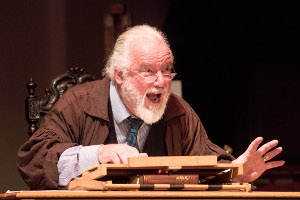
John Tomlinson in Kokoschka's Doll.
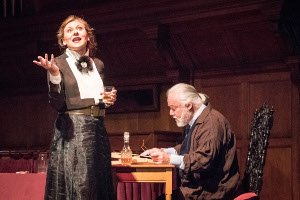
Rozanna Madylus and John Tomlinson in The Art of Love.
Our latest double-bill, Kokoschka's Doll/ The Art of Love: Alma Mahler's Life and Music, featuring Sir John Tomlinson, Rozanna Madylus and Counterpoise, has been performed ten times to date, at venues up and down the country.
Kokoschka's Doll
by John Casken
'Tomlinson's titanic, heart-rending performance' (Daily Telegraph), 'the incomparable John Tomlinson', 'a compelling dramatic presence' (Guardian), 'magnificent' (Opera),'Counterpoise's ceaselessly versatile and intriguing combination of piano, violin, trumpet and clarinet/saxophone' (Independent), 'Shot through with echoes of Wagner and Mahler, Casken's chamber score ' is lean and effective' (The Times), 'riveting' (Seen and Heard International), 'engaging and thought-provoking' (Opera)
For Alma Mahler, the painter Oskar Kokoschka (1886-1980) was just one of a string of eminent lovers, but for Kokoschka his brief affair with the widow of Mahler was to haunt the rest of his life. Shortly after the liaison ended, in 1914, Kokoschka commissioned a life-size doll of Alma, which he took to concerts and other public events, finally destroying it at a party to which all his friends were invited. Alma is featured in many of his paintings, not least the famous double portrait of the couple known as The Bride of the Wind.
The text of this new work, commissioned by Counterpoise, for singer/narrator and ensemble, is by John Casken and Barry Millington, based on poetic and epistolary texts of Kokoschka. It describes the affair as seen through the eyes of Kokoschka as a older man, evoking the passions unleashed by the affair, against the background of the physical and psychological traumas suffered by Kokoschka in the First World War. The score weaves the texts into a musical fabric that references fin-de-siècle Vienna (including the music of Wagner and Alma Mahler) while being of our own time.
The Art of Love: Alma Mahler's Life and Music 'superb, unmissable' (Independent), 'imaginative arrangements by David Matthews' (Guardian), the 'fine mezzo Rozanna Madylus' (Independent), 'Madylus was an engaging stage presence' (Daily Telegraph), 'compelling performances' (Opera)
Kokoschka's Doll, which lasts 40 minutes, is complemented by a sequence of music and text, featuring the work of Gustav and Alma Mahler, Wagner and Zemlinsky, under the title The Art of Love: Alma Mahler's Life and Music. The latter includes songs by both Mahlers arranged for Counterpoise by David Matthews (featuring Einsamer Gang, recently discovered by Deborah Calland and Barry Millington), as well as a Webern Trio movement (unpublished and previously unperformed in the UK) for Counterpoise forces, with continuation by Matthews. The singer adopts the persona of Alma and delivers a text (by Barry Millington) telling the story of her affairs with Zemlinsky, Mahler and Kokoschka.
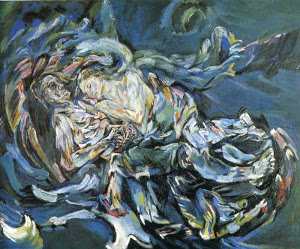
Kokoschka's painting The Bride of the Wind (also known as The Tempest), an allegorical picture in which the artist is depicted lying beside Alma Mahler.
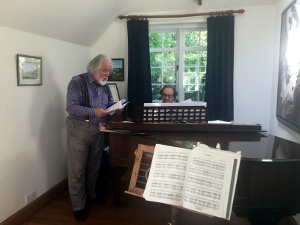
John Tomlinson rehearsing Kokoschka's Doll with the composer at the piano.
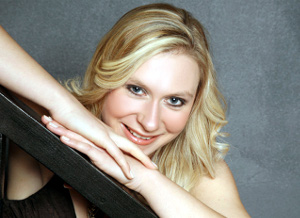
Rozanna Madylus plays the part of Alma Mahler in The Art of Love.
The Shackled King/Brünnhilde's Dream
The Shackled King
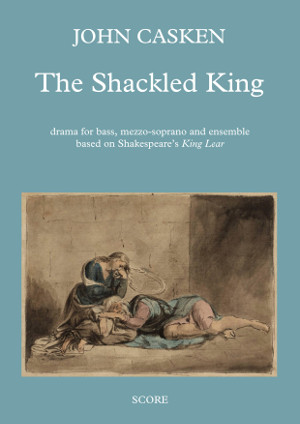
Score of The Shackled King with William Blake’s Lear and Cordelia in Prison (©1779). Photo ©Tate N05189 used under Creative Commons CC-BY-NC-ND 3.0 (Unported)
Sir John Tomlinson, who has been striding the world's opera stages for several decades, notably in the role of Wotan in Wagner's Ring, has long been contemplating the role of Shakespeare's Lear and sees parallels between the two characters. This new monodrama by John Casken affords him the opportunity to incarnate the aging, delusional king in a musical setting that incorporates Shakespeare's text in the form of speech, sprechstimme and singing. It is a role destined to crown Sir John's glorious career. Rozanna Madylus plays the roles of Cordelia, her sisters and the Fool.
The work begins with Lear and Cordelia in prison. There are flashbacks - the first to the beginning of the play and the dividing of the kingdom, the second to the scene with the Fool and the storm before time shifts back again to the present: the prison scene, followed by the deaths of Cordelia and Lear.
Brünnhilde's Dream
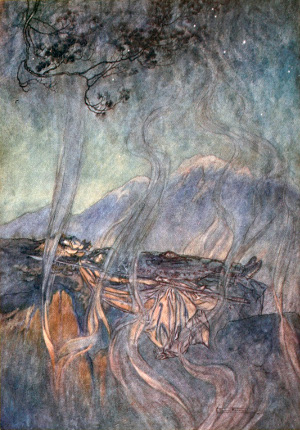
The Slumbering Brünnhilde by Arthur Rackham
The other half of the programme is a sequence of words and music entitled Brünnhilde's Dream, imagining the state of mind of Wotan's favourite Valkyrie daughter as she lies on the rock, surrounded by fire, after the end of Die Walküre. Music by Wagner, Fanny Mendelssohn, Schubert, Schumann, Zemlinsky, Berg, Szymanowski, Henze and Johanna Müller-Hermann. The acclaimed mezzo-soprano Rozanna Madylus, who scored such a success in our Alma Mahler programme, takes the solo role.
Medea's Cell/The Story of Jenny
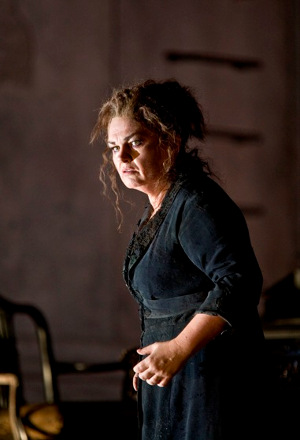
Susan Bullock as Elektra
The internationally acclaimed soprano Susan Bullock takes centre stage in an enthralling double-bill. Medea's Cell (text by Keith Warner, music by David Blake) is a reworking of the classical myth in a contemporary setting. In a condemned cell on the eve of her execution, this modern Medea is accused of a murder of which she's innocent. Her own children die without her lifting a finger. Is she guilty? Or is she also a victim? A noir murder mystery.
Keith Warner, one of the leading opera directors of the day, joins forces with David Blake, composer of Toussaint (ENO, 1977) and other well-received works of music theatre.
Medea's Cell is complemented by a monodrama telling the story of Jenny, the protagonist of several Brecht/Weill songs. The sequence includes Alabama Song, Speak Low, My Ship and Surabaya Johnny, with linking text by Barry Millington.
Rags to Riches
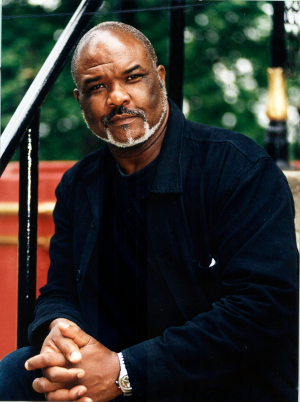
Willard White
For over four decades Willard White has been in demand on the world's stages as an operatic bass-baritone of exceptional quality and charisma. With the all-star ensemble Counterpoise he presents an evocative programme of music and poetry tracing the progress of rag, blues and other jazz forms from the Deep South and Harlem to the legendary cabarets of Paris and Berlin. Music by some of the greats of the era, including Louis Armstrong, Duke Ellington, Kurt Weill, George Gershwin ('A Foggy Day', 'Love Walked In') and Frederick Hollander (of 'Falling in Love Again' fame) as well as the spirituals that Sir Willard delivers with incomparable poignancy.

